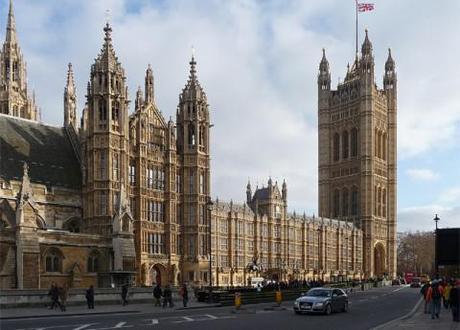
The House of Lords: Up for reform? Photocredit: Geograph
The House of Lords is in the political firing line once more, as plans for reforming the venerable chamber are outlined. Nick Clegg, the Deputy Prime Minister, is pushing for a largely elected House. A cross party committee chaired by Lord Richards has set out the following suggestions: 450 peers, serving for 15 years. 80 per cent of them would be elected; 20 would be nominated; one third would be replaced every five years; and peers who didn’t show up would be struck off. Most MPs and peers on the committee think that the issue should go to a referendum. David Cameron, however, is not in favour of one, as all three parties are committed to reform. Commentators are split – there are those who argue for an entirely elected chamber, via proportional representation; and then there are those who say that the House of Lords is fine as it is.
“We are only going to get Lords reform through if we all behave like reasonable, rational, sensible people,” said David Cameron, quoted on The Guardian.
Total reform. It’s exhausting thinking about how many times people have tried to reform the House of Lords, said Steve Richards in The Independent. Tony Blair tried (at least twice); Gordon Brown Once. Labour didn’t even manage to abolish all the Hereditary Peers (92 remained). Those who want to kill off reform have some “powerful arguments.” In a time when Prime Ministers are “alarmingly inexperienced”, the Chamber offers excellent scrutiny. But ultimately, we can’t vote the Chamber out. And that doesn’t sti well with democracy. Plus, the Lords is “becoming absurdly overpopulated.” Clegg is right to press on with reform.
It may not make sense, but it works. Reforming the House of Lords is pointless, said Alex Massie in The Spectator. As it currently stands, it works, though it doesn’t “make sense” – and it works precisely because it doesn’t “make sense”, largely because of its “senses of propriety and shame.” Having an elected chamber would only increase the power that political parties have. With cross-benchers, bishops, some hereditary peers even, at least they have independence. With the House of Lords, and “increase in democracy can only compromise its present efficiency.” In any case, the electorate are subjected to “too much campaigning” – why would they want to vote more? The best argument for retaining the House of Lords as it is is that it’s largely “insulated from the frenzies of popular opinion,” and thus can “protect the individual from the attentions of an already overmighty state.”
Clegg’s idea is an excrescence. And in any case, will reforming make our “governance better or worse?” asked Philip Johnson on The Daily Telegraph. Of course, the House of Lords can be reformed – and has been. But it absolutely must retain its quintessential function – to act as a check on the House of Commons, and to give wise and “impartial” advice on legislation. This will be totally wrecked by having a wholly elected “senate.” Imagine – a whole other “chamber of career politicians, beholden to party machines and government whips.” If the Coalition goes ahead with this Bill, “there will be blood on the floor.” Better abolish the Second Chamber altogether, than “inflict the monstrosity proposed by Mr Clegg.” We should look at Lord Bingham’s proposals – he suggested a “Council of the Realm”, which would simply scrutinise new laws, rather than delay them. “It is certainly better than the excrescence that Mr Clegg has in mind.”
We need reform – but not this way. Lord Trefgarne, who sat on the Committee of the House of Lords Reform Bill, wrote in strong terms to The Telegraph: the proposed reforms, he said, would make an aggressive and powerful Senate which would “clamour” for more power. They might even repeal the 1949 Parliament Act. The new Senators might want to “involve themselves in constituency affairs” – but what about MPs? And if the peers are elected by Proportional Representation, then this would give the smaller parties more room – which is probably why Nick Clegg is enthusiastic about it. But other parties may not be so keen. “There are arguments for a proper Senate – perhaps along US lines – but not the defective hybrid proposed in the draft Bill.”
Jury service! The 38 Degrees blog had a different suggestion: model it on Jury Service. ”Since we trust, ‘ordinary’, people to decide the guilt or innocence of people brought to trial, why should they not be entrusted with reviewing the business of the House of Commons? This change would create a second chamber whose composition would not reflect family background, political placement, or cash donations. Make a break with a muddled and discredited past and establish a second chamber, founded on ancient and honourable tradition, but with a membership representing the entire nation.”

